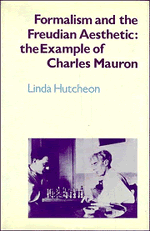Book contents
- Frontmatter
- Contents
- Preface
- Acknowledgments
- Introduction
- Part I The critical formation: science, formalism, and aesthetic contemplation
- Part II Psychoanalysis and literary criticism
- Conclusion
- Appendices
- A Critical works of Charles Mauron referred to in this study
- B Translations by Charles Mauron
- C Published poetry and prose of Charles Mauron
- D Works of Sigmund Freud referred to in this study
- Notes
- Index
B - Translations by Charles Mauron
Published online by Cambridge University Press: 12 January 2010
- Frontmatter
- Contents
- Preface
- Acknowledgments
- Introduction
- Part I The critical formation: science, formalism, and aesthetic contemplation
- Part II Psychoanalysis and literary criticism
- Conclusion
- Appendices
- A Critical works of Charles Mauron referred to in this study
- B Translations by Charles Mauron
- C Published poetry and prose of Charles Mauron
- D Works of Sigmund Freud referred to in this study
- Notes
- Index
Summary
IT WAS ROGER FRY who first started Mauron on his translating career. To rekindle the almost-blind young man's interest in his life, Fry helped him begin translating Forster's A Passage to India. With Marie Mauron's help, the work was completed and sent off to Gabriel Marcel, then director of the “Feux croisés” collection at Plon in Paris. Marcel was not at all pleased with the translation and demanded extensive changes. Many of these were rejected by Forster and Mauron both: For example, Marcel corrected deliberate errors introduced by author and translator in order to capture Hindu English. Forster suspected that this was a case of Parisian snobbery toward the provinces, and attacked Plon for wanting to mutilate his text without his permission. Mauron, for his part, replied point by point to Marcel's objections, only to learn that Marcel had never read the English version at all, and therefore could have had no idea that certain passages, accused of being ironic in French, were indeed intended as such in the English. Marcel continued, however, to complain of Mauron's stubbornness and intransigence until Forster threatened to forbid publication of the novel.
After this stormy start, Mauron's career settled down. He translated stories by Fry and Forster before tackling longer works, including Virginia Woolf's Orlando and Flush. Earlier he had translated the “Time Passes” section of To the Lighthouse, a difficult task, which Fry felt Mauron carried through very well.
- Type
- Chapter
- Information
- Formalism and the Freudian AestheticThe Example of Charles Mauron, pp. 207 - 210Publisher: Cambridge University PressPrint publication year: 1984



